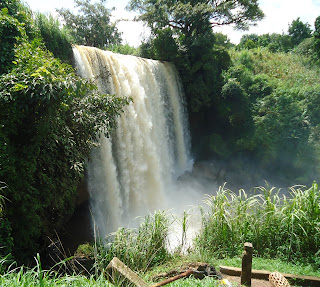Ethiopians generate challenging questions about PJ
ADDIS ABABA, ETHIOPIA—The last two days here, I’ve given
four presentations to the public, to journalists, and to a mix of academics and
students at Addis Ababa University. The common denominator has been the
excellent, challenging questions being directed my way.
 |
| Wednesday, at the American Corner, was streamed live |
While today’s questions were delivered the old fashioned
way, many inquiries yesterday were generated online, through the U.S. Embassy
Addis Ababa’s Facebook page. (The embassy and State Dept. are sponsoring my
visit here). In fact, the embassy streamed the event live on their Facebook
page, and got over 19,000 views. Those two videos of my presentation are still
posted on their page. Just go to Facebook, type in U.S. Embassy Addis Ababa,
and you should be able to find them.
The most frequent inquiries from my Ethiopian friends—all good
questions—are:
Isn’t peace journalism just good journalism?
Peace journalism’s foundation is certainly good traditional journalism,
featuring balance, objectivity, verified facts, fairness, and so on. I believe
peace journalism builds on and transcends this foundation, however, with its
emphasis on giving peacemakers and the voiceless a voice, and leading
discussions about solutions. But I told my audiences, if you want to call peace
journalism good journalism, that’s fine with me.
Does peace journalism ignore stories that are violent, could
fuel conflict, or upset people?
No. News is news, and peace journalists must report it, even if it makes people
uncomfortable or causes turmoil. The example I used during my lectures was a
terrorist attack. We must report it, but as peace journalists, why can’t we report
it in such a way that it’s less sensational, less bloody, and creates a little
less panic among the populace?
 |
Thursday, at Addis Ababa University. I have no idea what's
going on here. |
What if the government kills peaceful protesters like the
case in Ethiopia? How can journalism be peaceful? (From Facebook)
This is similar to the response for the previous question. This is news, and
must be reported, so the question becomes, how do we report it? Do we report it
in such a way that it fuels the fire, or do we report in a more matter-of-fact
way that doesn’t make angry people even angrier. Compare these two sentences: 1.
Bloodthirsty government thugs brutally
slaughtered two protesters today in the city square. 2. Two protesters were
killed today by government troops in the city square. The second sentence doesn’t
ignore what happened; it just doesn’t make it worse.
A peace journalism story on this incident would also dig
into the causes of the incident, as well as report on possible non-violent
responses to what happened.
Does peace journalism conflict with developmental journalism?
Developmental journalism is seen by some here as journalism that exists to
support the government’s development policies and agenda. In my view, no
journalism that is really journalism exists to support any government or governmental
policy. Rather, we exist to provide accurate, useful information to the
population. Thus, if a government sponsors a roads project, then it’s a peace
journalist’s job to analyze that project, and report what’s going well, and
also what’s going not-so-well, and what impact the project’s success (or failure)
has on average citizens.
Thanks to all the program participants in Jimma and Addis
Ababa for your keen interest and for your tough questions. I look forward to
continuing the discussion online, and, I hope, in person sometime in the near
future.










